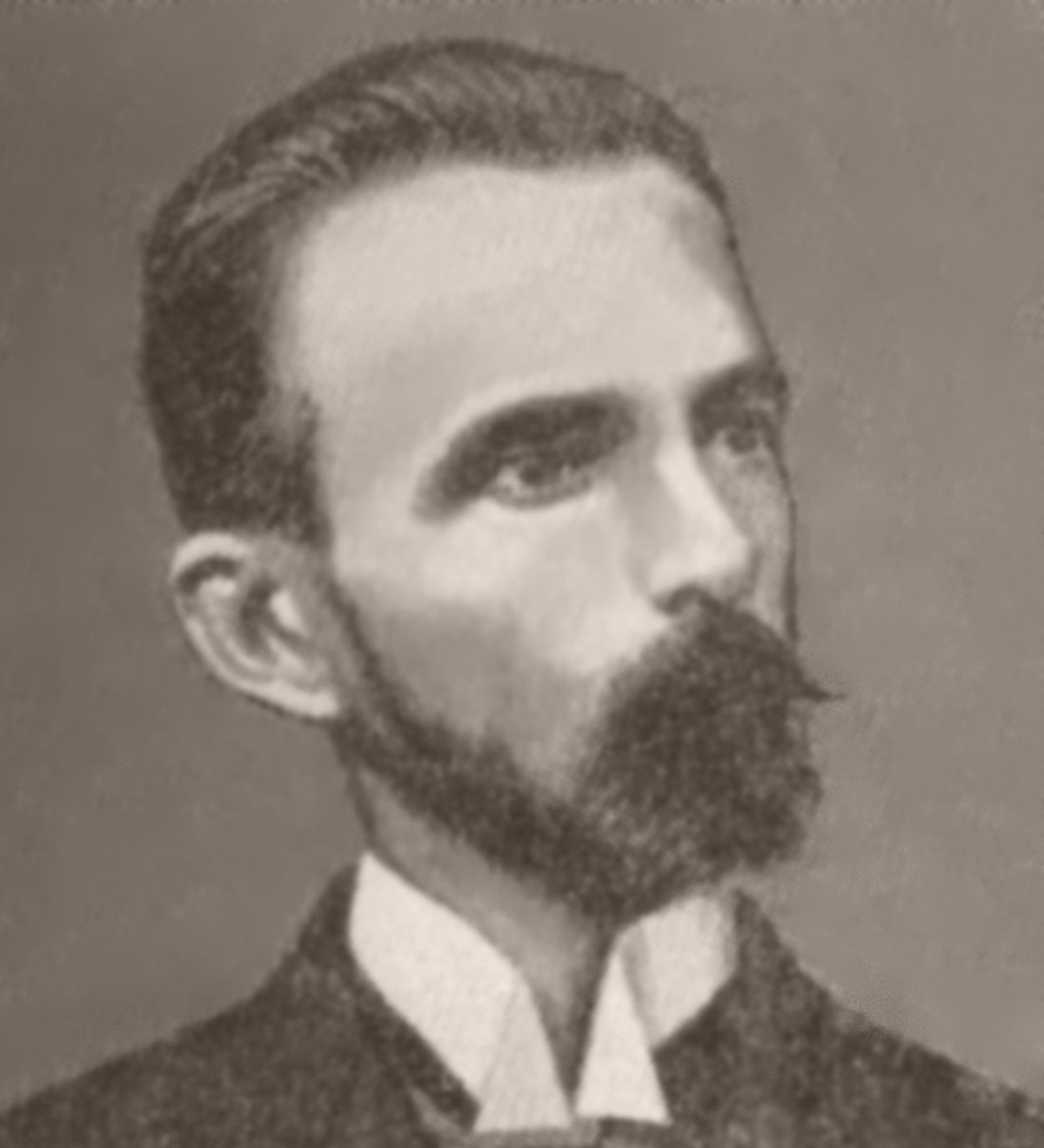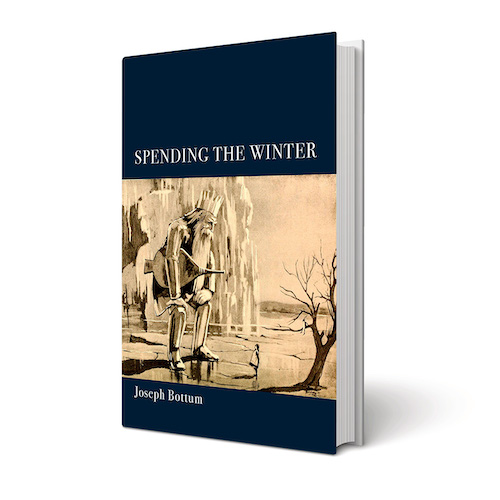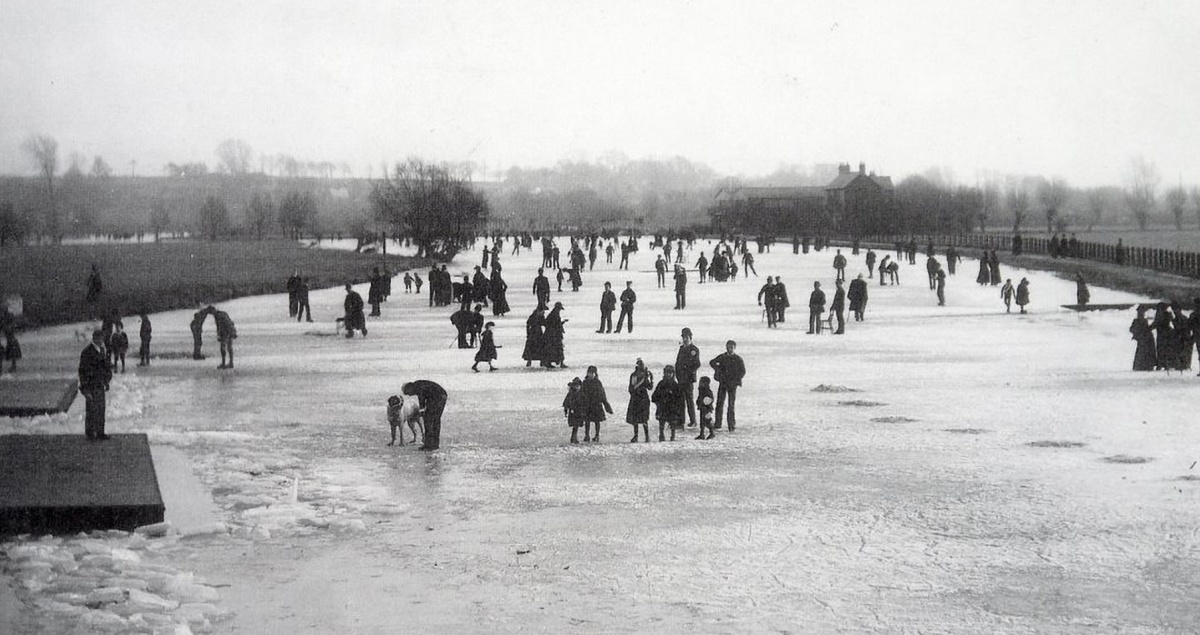Joseph Bottum has long been known for his elegant prose style, omnivorous literary allusiveness, and cultural critic’s eye for what we know, what we think we know, and the sometimes embarrassing gap between those things. His decades of editorial work for The Weekly Standard and First Things guided both those organs through their great ages of growth from political and religious magazines to eclectic and spirited journals of cultural review. Less known is that Bottum’s first book was a collection of poems and that he has published poetry and songs here and there ever since. The Fall and Other Poems appeared in 2001; a book of songs, The Second Spring, in 2011; and now, two decades on, Bottum has published his second full-length collection, Spending the Winter.
A new book of poetry is the culmination of years of elegant prose and wise counsel from a writer-editor of capacious learning and tender feeling.
The virtues of his prose, which are on their most impressive display in his study of post-Christian America, An Anxious Age (2014), as one might expect, translate well into verse. Consider these lines from the title poem of his first book, which captures the colors of autumn in New England:
New England comes to flower dying.
Leaves like broken petals trail
in fluttered rage from tainted trees.
The year grows willful. Stagnant ponds
strain to clamber quarry walls.
Time slips indenture, backing age
on fuddled age, confusing fall
with summer—snow with hawthorn flurries,
apple flakes along black boughs.
Consider also this stanza from the early “Timor Mortis,” which shows Bottum’s talent for the rough and heavy rhythms of song:
The flinch of the doe
as she drinks at the river,
The twitch of the owlthe flutter of mice:
Death is the suddenShrill in the shiver,
The shudder, the stutterthe stand-still of night.
The freedom of the poem to be a thing apart from any argument frequently allows Bottum to indulge his taste for the musical but also the grand, ornate, and classical, as in these lines loosely translating one of Horace’s odes:
Once we drop below the west and eyeless judges
carve their stone decrees,
nor righteousness nor noble birth nor skill with words
restores our day to light.
In the final poem of his first book, he writes in a similar mode to his mentor, the late Reverend Richard John Neuhaus, pleading the case of art and poetry in a milieu consumed with the great life issues of our day, abortion and assisted suicide:
If I have seen geese low on the east horizon,
seen the long reeds strain in the dawn to follow,
watched the first clean ice of the season take
roots for the winter,what worth are those hard scenes in a day that fathers
lunge at half-born sons with a knife, and daughters
name the swift-gained deaths of their mothers high
gestures of mercy?
In passages such as these, we find that Bottum has a fine ear for the strong rhythms of song, an eye for the vivid phrasing that rekindles familiar details, and finally a voice blessed with a classical clarity that can speak of public and private matters, of death and politics alike.
All those qualities have been retained and improved in Spending the Winter, a volume that was clearly the work of many years while its author was spending much of his time at other things. The effect is a collection of poems with an assured voice, a great variety of forms and subjects, but one where the poems do not necessarily form a whole greater than their parts. The poems themselves come together by the same serendipity that one of Bottum’s epigrams describes:
Worthless things and things of wonder
Are fish in a single lake—
For much of bliss is caught by blunder,
And joy by some mistake.
This is not to say there is no order or unity to the volume. We begin in spring, at Easter, and his daughter, Faith, appears in the poems as a young girl. We end with poems that meditate on winter and death (and meanwhile, though it is not mentioned in these pages, Faith has become an editor at the Wall Street Journal). The book does take us some place and, indeed, where it takes us is most often to those great classical themes of new life, the shudder of death, and the moral wisdom that may result for those who mark these things well. In the opening poem, “Easter Morning,” Bottum reflects on the new growth of the season:
Quick as dawn, the dogwoods have raised
Improbable awnings, christened with rain.
Thrusts of witch-hazel, stands of rue,
And there—there, across the stream,
In the shade of those dark-lichened rocks—
White phlox and geranium strain
To reach the angled light. One bright
Morning, a clean April day,
Amazes familiar paths with a green
Tangle and baizes the winter’s stain.

This stanza contains several of the typical characteristics of Bottum’s poetry: a loose tetrameter line that vacillates between speech and song, a frequent but irregular use of rhyme, and an eye for the familiar that finds vivid expression less in the well-observed detail than in the well-turned phrase. As we hear of all that is newly coloring the world, the fresh bloom of his young daughter “runs by the brief flowers.” The scene that unfolds has already a certain gravity through the sheer quality of its description, but the “Quick” spring is a reminder that the beautiful changes, and of all that goes wrong in our turning world:
Every spring pretends a pity
For all the pretty, short-lived things.
Last night I watched the fire zones,
The bombers’ plumes and tracer rounds,
Blooms of war on the TV news.
And now in these green trees I see
The graves of gods and a grove of bones.
The moment is aphoristic and memorable in its first two lines and vividly realized as a sketch of our new bloody century in the lines that follow.
Even in these two quoted stanzas we find a compelling vision of brief beauty coupled with the inevitability of finitude and the corruptions of history, but the poem does not idle there. Dedicated to René Girard, the great philosopher of the meaning of sacral sacrifice and communal scapegoating, “Easter Morning” also recounts the ancient sacrifice of priests’ attempting, by bloody rite, to “wake” the nature of “the frozen world.” Nature is a snare, a vacillation between dormancy and life, death and beauty, all to repeat in a vertiginous and endless cycle. But, suggests Bottum, the “parish bells” of Easter call us beyond the “cold fear” to such a historical vision that will induce to a more permanent kind of “rising, rising.”

By Joseph Bottum
(St. Augustine’s Press, 2022)
Translations and Imitations
Other poems in the first part of the volume repeat the theme that “All brightness leans to dark / And doubt.” In the next, Bottum’s attentions move from birth and death to language and translation. Entitling this part “Imitations,” Bottum signals with that word what Robert Lowell and other poets have done before him: craft poems that are either translations or versions of poems from other languages that also serve to reveal something about the character and concerns of the translator himself. Lowell famously translated the opening of Homer’s Iliad to read “Sing for me, Muse, the mania of Achilles / that cast a thousand sorrows on the Greeks.” The choice of “mania” for the Greek word Fitzgerald and Lattimore both translate blandly as “anger” is closer in sound to Homer but hints at Lowell’s own “mania,” or mental illness, for which he would be institutionalized at least a dozen times.
Bottum’s imitations convey a quieter, subtler kind of reference. A sonnet translated from the Portuguese of Raimundo Correia and an original sonnet dedicated to his Brazilian wife and daughter cleverly suggest Bottum’s personal debt to that “final flower of Latin,” whose qualities he likens to “a butcher’s knife on a bed of satin.”
More revealing in their way are four “Englishings of Neo-Latin Hexameter.” With the recent publication of A.M. Juster’s translation of John Milton’s Latin Elegies, more widespread attention has been brought to that curious feature of early modern literary culture. We now know and prize its vernacular literatures, from Petrarch to Shakespeare; but not only Milton but George Herbert and many other English poets also composed poems in the lingua franca of the Europe of their day. Those Latin poems have often a different texture from the poets’ work in English. More stentorian in tone, general in vocabulary, lacking the colloquial accent of a spoken language, such poems often sound de facto more classical and at just a slight elevation from the terrain of daily life.

Encountering Bottum’s English versions of Latin poetry provoked the thought in me that this has always been his own natural idiom. Latinate and aphoristic, sagely observed but—with important exceptions—lacking in the precise observation of minutiae necessary for realism. This becomes especially clear in Bottum’s version of William Baker’s 1634 “Descriptio Brumae”:
So Londoners play blustery games,
And leaving a hearth-heated home,
Take to the streets, thronging the squares—
Astray from their day jobs to roam
In search of fresh sport, jostling to join
Tomfoolery’s revels and show.
Football breaks out—scrums on the ice,
The contest of feet in the snow.
The poem is lovely in its description of a London whose work has been halted by a snowstorm and where forced leisure and reveling are made possible by a frozen Thames. It shows all from about the same eye level as a Bruegel the Elder painting. It also recollects some of Bottum’s own writings on his South Dakota homeland. Further, the poem captures the general, the typical, and the essential, rather than the specific or peculiar.
His translation of George Buchanan is almost as compelling. Buchanan writes from his posting in Portugal of his longing for Paris, and one hears faintly in the background Bottum’s nostalgia for his years in the eastern metropolises of the United States. “The Transit of Venus” captures the astronomer Jeremiah Horrocks’ somewhat contrived longing for the planet of love:
Why do you flee, Beautiful One,
Abandoning lovers and friends?
Why must you leave, why go astray,
Concealing the gift of your face?
Finally, “Epitaph for a Dog,” a very loose version of Vincent Bourne’s 1724 “Epitaphium in Canem,” reminds us that certain kinds of sentimentality and humor have been with us for centuries and never quite grow old.
The neo-Latin style is, I think, that of most of Bottum’s poems, which generally try to sum up the typical, to lead the particular toward the universal and the moral level of things. In his first book, the desire to be aphoristic and to rise above the particular leaves some of the poems feeling like experiments in archaic poetic poses and subjects; the poems “Diaspora,” “Black Scrawl,” and “Song” sound a bit like the nostalgic medievalism of John Keats or the early Ezra Pound. But, in translating early modern Latin, Bottum pays homage to the older styles that inform his while also making it distinctly modern in the “Englishing.”
Music and Meter
It is not only in their themes that these poems are revelatory. Bottum’s practice of poetry hovers always close to music and song. In English, our paradigmatic line is the iambic pentameter. The five-stress line is flexible enough to be musical when needed, but it can also accommodate the plainest speech and the most ornate and golden rhetoric. Bottum’s poems are usually one metrical foot shorter, in some sort of loose or tight tetrameter or trimeter. Tetrameter is the language of ballad and song, of music almost to the exclusion of rhetoric.
Most of Bottum’s poems, which generally try to sum up the typical, to lead the particular toward the universal and the moral level of things.
The eccentric metrical choices of Bottum’s translations—which he appropriately names “Choriambs and Trisyllabics”—help us to hear the heavy musical rhythm of these otherwise classical and rhetorical poems. A choriamb is a classical metrical foot that, in English, would indicate two stressed syllables surrounding two unstressed ones; by “trisyllabics,” Bottum seems to mean an anapestic trimeter. I shall illustrate his meter by quoting a stanza from the Buchanan translation with the stressed syllables in bold:
How often I’ve asked seabirds in flight
For news of my distant desire.
Far Paris, my love, city of light—
The sweet Marianne of my song . . .
The remainder of Spending the Winter includes a run of witty epigrams, hymns, carols, and light verse, as well a handful of more serious lyrics. It also includes “Four Seasons: A Graduation Poem,” which Bottum composed as the Phi Beta Kappa poem at Princeton just this last spring. My understanding is that it was this poem that inspired Bottum to gather his poems into a new volume, and rightly so. This poem is the highlight of the book. With its public occasion and classical style, its allusive nods to other poets and writers, its drawing the seasons of life into a unified poetic whole, it shows Bottum’s poetic talent to best advantage. The poem opens with the melancholy vision of the passage of time with which the book itself begins:
God hunts old men out of season,
Winters them before they fall.
Time begins to lose cohesion.
The caller walks behind the call.
And it culminates in the kind of humanist summary vision that redeems melancholy by chastening the spirit. We know that “every change needs something’s dissolution,” such that “freedom of will requires death.” What then? In a return to the more rhetorical iambic pentameter, he concludes:
The fact that all that lives must die
Unburdens us and eases small dismay.
Undoes ambition, greed, the rush of fame.
Unkindness, too: The price of living long
Is burying your parents, teachers, friends.
Be gentle. Everyone you know is dying.
The best books of poetry really do form a whole greater than their parts, and, as I have said, Bottum’s does not. The book is, however, very good. There’s not a bad poem in it. The opening poems possess a great lyric power; the translations are spirited and civilized; the songs beautiful; most importantly, the long graduation poem is at once perceptive, pithy, and wise. He has found a good way to spend the Dakota winter.




